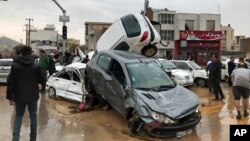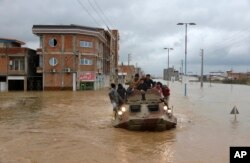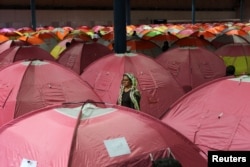President Hassan Rouhani travelled to flood-hit zones of Iran for the first time Wednesday after nine days of heavy rains that have inundated most of the country and killed 43 people.
The authorities have been struggling to cope with flooding after extreme rainfall which at times has been equivalent to half of the average annual levels within 24 hours.
The disaster, which one government minister blamed on climate change, struck in the middle of Iranian New Year break, with many relief workers on leave and millions of holidaymakers on the roads.
"When suddenly 25 out of 31, and on some days all provinces are struck (by flooding), this may be an unprecedented phenomenon," Rouhani said in Tehran, quoted by the government's website.
Rouhani then flew to the northeastern province of Golestan, one of the areas where the floods first struck on March 19 and have since killed at least 10 people, according to the latest official figures.
Speaking at a crisis meeting in Golestan aired live on state television, Rouhani responded to criticsm he was slow to visit the disaster-hit zone.
"I had planned to come in the first days, but ultimately due to considerations it was decided the first vice-president would travel here," he said.
The deluge spread rapidly from the north to the west and south of the country on March 25 before hitting the center of Iran as the weather front moved eastwards.
"In some regions, rainfall within 24 hours equalled that of the prior 10 months," said Mahmoodreza Peiravi, secretary general of Iran's Red Crescent Society.
"If you take the number and ferocity of the floods into account, the death toll was thankfully not that high," he said, while warning it could rise in coming days.
"The floods struck during the holidays and many vacationers on road trips were affected by it," Peiravi told AFP.
"It is possible that some vacationers might have been carried off by the floods and no one is yet aware of it," he warned.
Day of mourning
A day of mourning has been declared for Thursday in the southern city of Shiraz, the worst-hit area where the flooding claimed the lives of 19 people and injured more than 100.
The latest toll included six people who drowned when a boat full of rescuers and victims overturned in the northeastern Gomishan region in Golestan province.
"Another body has been found but we have not yet recovered it," the area's emergency services head Alireza Kamalgharibi said, adding that search and rescue operations would continue as it was unclear how many people had been on board the boat.
Another four people were killed in the western provinces of Kogiluyeh-Va-Boyerahmad and Lorestan, said Morteza Salimi, head of the Iranian Red Crescent's search and rescue organization.
One death was also reported in each of Khuzestan, Kermanshah and Semnan provinces.
"More than 43,000 people were rescued and nearly 27,000 were provided with emergency accommodation," Salimi said, quoted by Tasnim news agency, adding rescue operations had been carried out in 30 provinces.
Officials estimate the flooding caused hundreds of millions of dollars in damage to homes, farms and infrastructure.
The skies have mostly cleared up for now but Iran's meteorological service has warned of more heavy showers from Saturday.
Such a widespread flood threat is unprecedented in arid Iran, which until 2018 was dealing with decades of drought.
"Climate change is forcing itself on our country," Energy Minister Reza Ardekanian, who is in charge of dams and water supply, said on Monday.
"These unprecedented floods in our country are because of climate change worldwide," he added.






